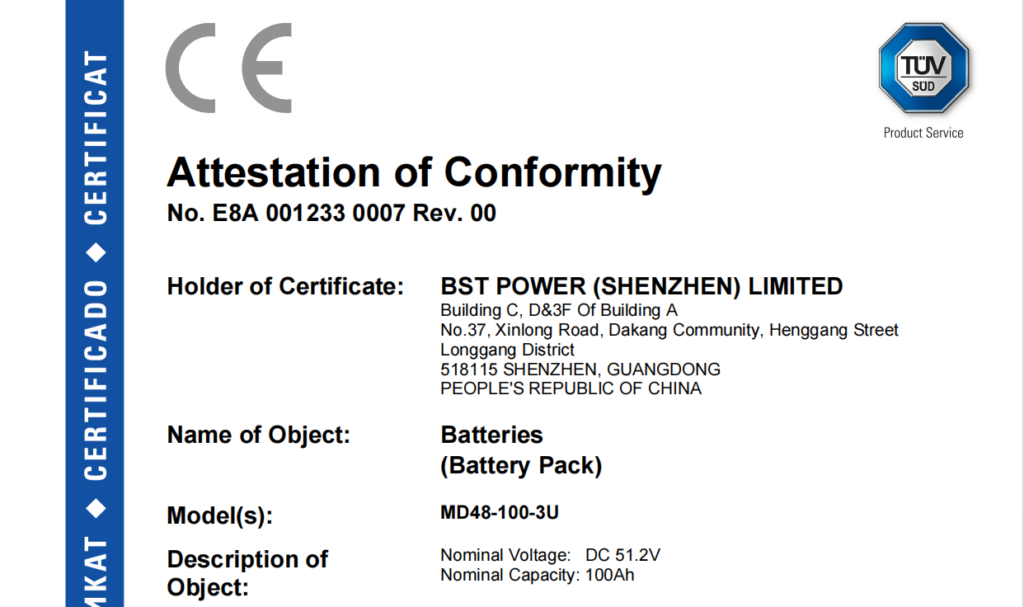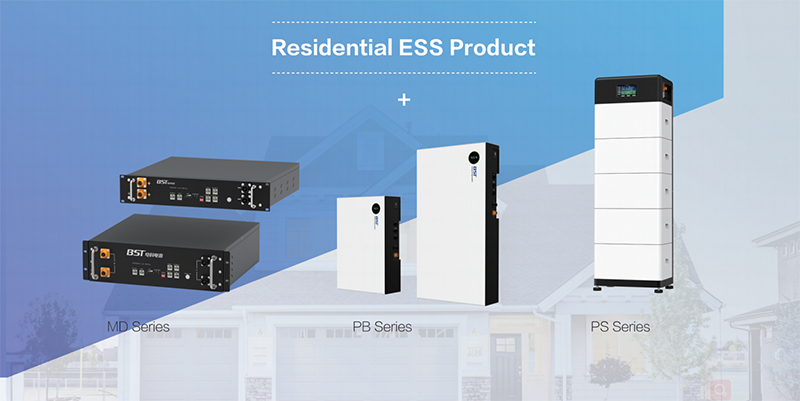The global energy storage systems market is experiencing explosive growth. According to research, the industry is projected to grow from $130 billion in 2023 to over $500 billion by 2030, driven by the increasing adoption of renewable energy and energy security concerns. As demand surges, ensuring the safety, reliability, and compliance of energy storage batteries through certifications has become critical for manufacturers, businesses, and end-users.

Why Are Energy Storage Batteries Certified?
Energy storage batteries play a central role in residential, commercial, and industrial energy systems. However, they also pose potential risks such as fire, chemical leaks, and environmental hazards if not properly designed or tested. Certification ensures:
- Enhanced Safety: Batteries undergo rigorous testing to reduce risks such as overheating, fire, or explosion.
- Global Compliance: Certifications allow products to meet regional and international regulatory requirements, ensuring market accessibility.
- Consumer Assurance: Certified batteries reassure customers of product quality, safety, and performance.
- Sustainability: Certifications often include tests for environmental impact, ensuring batteries are eco-friendly and can be safely recycled.
Common Certifications for Residential Energy Storage Batteries
1. CE-EMC Certification (Electromagnetic Compatibility)
- Relevance: Required for products sold in Europe, this certification ensures that electrical devices do not interfere with other electronic equipment and can withstand electromagnetic disturbances.
- Testing Details:
- Emission Testing: Measures the level of electromagnetic interference (EMI) generated by the battery. Excess EMI can disrupt other nearby devices such as routers, televisions, or medical equipment.
- Immunity Testing: Evaluates the battery’s resilience to external electromagnetic disturbances, ensuring it continues to operate effectively even in environments with high EMI levels.
- Additional Impact:
- Protects users in densely populated residential areas, where multiple electronic devices may operate simultaneously.
- Helps manufacturers avoid penalties or recalls due to non-compliance with EU regulations.
2. IEC62619 Certification
- Relevance: This certification is a global standard specifically designed to address the safety of rechargeable lithium-ion batteries for industrial and residential use.
- Testing Details:
- Thermal Runaway Test: Simulates overheating scenarios to ensure the battery can handle elevated temperatures without causing a fire.
- Overcharge Protection: Tests whether the battery can withstand excessive charging without exploding or degrading significantly.
- Mechanical Integrity Tests: Batteries are subjected to shock, drop, and vibration tests to evaluate their durability under physical stress.
- Circuit Fault Protection: Ensures the battery can safely disconnect power during internal short circuits, reducing the risk of catastrophic failures.
- Additional Impact:
- Ensures long-term reliability, even under extreme or abnormal operating conditions.
- Provides peace of mind to homeowners, knowing the batteries meet stringent safety protocols.
3. UL1973 Certification
- Relevance: Recognized mainly in North America, UL1973 ensures the safety of batteries used in stationary applications (e.g., residential storage systems) and light electric vehicles.
- Testing Details:
- Electrical Tests: Validates the battery’s response to overcurrent, overvoltage, and electrical surges.
- Environmental Tests: Includes exposure to extreme temperatures, humidity, and pressure variations to ensure performance stability.
- Battery Management System (BMS) Evaluation: Ensures the BMS can monitor critical parameters such as temperature, voltage, and current in real time.
- Explosion and Fire Prevention: Batteries are subjected to simulated faults like internal short circuits to verify fire containment mechanisms.
- Additional Impact:
- Mandatory for batteries used in critical applications such as backup power during grid outages.
- Builds trust with North American consumers and regulators, who prioritize stringent safety standards.
4. UN38.3 Certification
- Relevance: Essential for the transportation of lithium-ion batteries by air, sea, or land. The certification ensures that batteries are safe for shipping without posing risks to carriers or the environment.
- Testing Details:
- Altitude Simulation: Verifies the battery’s performance at high altitudes (e.g., during air transport).
- Thermal Tests: Evaluate the battery’s ability to withstand rapid temperature changes from -40°C to 75°C.
- Shock and Vibration Tests: Simulates mechanical stresses encountered during transit to ensure the battery remains intact and functional.
- Short-Circuit and Overcharge Testing: Confirms the battery will not leak, catch fire, or explode under abnormal electrical conditions.
- Additional Impact:
- Facilitates seamless international shipping, ensuring batteries reach global markets without delays or rejections.
- Provides a benchmark for transport safety, benefiting logistics partners and end-users alike.
5. MSDS (Material Safety Data Sheet)
- Relevance: While not a certification, the MSDS is a crucial document that ensures the safe handling, transport, and disposal of batteries. It is often required alongside other certifications for regulatory compliance.
- Details Included:
- Chemical Composition: Lists hazardous and non-hazardous materials in the battery.
- Health Hazards: Identifies risks such as skin irritation or toxic exposure in case of leaks.
- Emergency Procedures: Provides first-aid measures, fire-fighting techniques, and spill containment strategies.
- Storage Guidelines: Details optimal conditions for battery storage to prevent degradation or accidents.
- Additional Impact:
- Enhances transparency for users, logistics companies, and recycling facilities.
- Reduces risks associated with improper handling or disposal, contributing to environmental sustainability.
Summary of Certifications
Certifications like CE-EMC, IEC62619, UL1973, UN38.3, and the MSDS documentation are essential for ensuring the safety, reliability, and market readiness of household energy storage batteries. These certifications:
- Enhance user safety by mitigating risks like fire, explosions, and electromagnetic interference.
- Enable global market access through compliance with regional and international regulations.
- Provide transparency and trust for manufacturers, partners, and end-users.
As the energy storage market grows, the importance of certified products cannot be overstated. Certified batteries not only protect users but also drive the transition to a more sustainable and energy-resilient future.
The Importance of Choosing BST as Your Partner
According to market data, certified products enjoy a 40% higher consumer adoption rate due to their reliability and safety. BST stands out as a trusted partner for the following reasons:
- Comprehensive Certification: BST batteries meet all major international standards, ensuring compatibility across global markets.
- Rigorous Quality Control: Products undergo extensive in-house and third-party testing to guarantee compliance.
- Proven Track Record: With 22 years of experience, BST has consistently delivered reliable, high-performance energy solutions.
- Commitment to Sustainability: BST’s focus on green energy solutions aligns with global efforts to reduce carbon emissions.
- After-Sales Support: BST offers unparalleled technical assistance, ensuring long-term satisfaction for partners and end-users.
FAQs: Certifications for Residential Storage Batteries
- Why are certifications necessary for energy storage batteries?
Certifications ensure safety, performance, and compliance, protecting users and enabling global market access. - What does CE-EMC certification ensure for energy storage batteries?
CE-EMC ensures that batteries meet electromagnetic compatibility standards, preventing interference with other devices. - How does IEC62619 certification benefit users?
It guarantees lithium-ion battery safety by addressing risks like overheating, overcharging, and mechanical stress. - What distinguishes UL1973 certification from others?
UL1973 focuses on safety for stationary applications, ensuring resilience to extreme environmental and electrical conditions. - Why is UN38.3 certification important for transportation?
It ensures the safe shipping of lithium-ion batteries by testing for altitude, temperature, and mechanical durability. - What role does the MSDS document play in battery safety?
The MSDS provides vital safety, storage, and disposal information to reduce risks and enhance environmental compliance.
Conclusion
Certifications form the backbone of the energy storage industry, ensuring safety, reliability, and regulatory compliance. Choosing a partner like BST, with its comprehensive certification portfolio and commitment to quality, positions you to succeed in this rapidly evolving market while contributing to a sustainable future.



